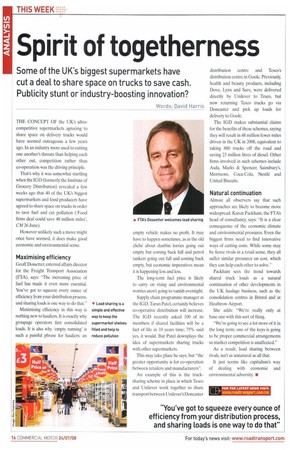Spirit of togetherness
Page 16

If you've noticed an error in this article please click here to report it so we can fix it.
Some of the UK's biggest supermarkets have cut a deal to share space on trucks to save cash. Publicity stunt or industry-boosting innovation?
Wards: David Harris
THE CONCEPT OF the UK's ultracompetitive supermarkets agreeing to share space on delivery trucks would have seemed outrageous a few years ago. In an industry more used to cutting one another's throats than helping each other out, competition rather than co-operation was the driving principle.
That's why it was somewhat startling when the IGD (formerly the Institute of Grocery Distribution) revealed a few weeks ago that 40 of the UK's biggest supermarkets and food producers have agreed to share space on trucks in order to save fuel and cut pollution (`Food firms deal could save 48 million miles', CM 26 June).
However unlikely such a move might once have seemed, it does make good economic and environmental sense.
Maximising efficiency
Geoff Dossetter, external affairs director for the Freight Transport Association (FTA), says: "The increasing price of fuel has made it even more essential. You've got to squeeze every ounce of efficiency from your distribution process, and sharing loads is one way to do that."
Maximising efficiency in this way is nothing new to hauliers. It is exactly why groupage operators first consolidated loads. It is also why 'empty running' is such a painful phrase for hauliers: an empty vehicle makes no profit. It may have to happen sometimes, as in the old cliché about dustbin lorries going out empty but coming back full and petrol tankers going out full and coming back empty, but economic imperatives mean it is happening less and less.
The long-term fuel price is likely to carry on rising and environmental worries aren't going to vanish overnight.
Supply chain programme manager at the IGD, Tarun Patel, certainly believes co-operative distribution will increase. The IGD recently asked 100 of its members if shared facilities will be a fact of life in 10 years time; 75% said yes, it would. But Patel downplays the idea of supermarkets sharing trucks with other supermarkets.
This may take place he says, but "the greater opportunity is for co-operation between retailers and manufacturers".
An example of this is the trucksharing scheme in place in which Tesco and Unilever work together to share transport between Unilever's Doncaster distribution centre and Tesco's distribution centre in Goole. Previously, health and beauty products, including Dove, Lynx and Sure, were delivered directly by Unilever to Tesco, but now returning Tesco trucks go via Doncaster and pick up loads for delivery to Goole.
The IGD makes substantial claims for the benefits of these schemes, saying they will result in 48 million fewer miles driven in the UK in 2008, equivalent to taking 800 trucks off the road and saving 23 million litres of diesel. Other firms involved in such schemes include Asda, Marks & Spencer, Sainsbury's, Morrisons, Coca-Cola, Nestle and United Biscuits.
Natural continuation
Almost all observers say that such approaches are likely to become more widespread. Karen Packham, the ETA's head of consultancy, says: "It is a clear consequence of the economic climate and environmental pressures. Even the biggest firms need to find innovative ways of cutting costs. While some may be fierce rivals in a retail sense, they all suffer similar pressures on cost, which they can help each other to solve."
Packham sees the trend towards shared truck loads as a natural continuation of other developments in the UK haulage business, such as the consolidation centres in Bristol and at Heathrow Airport.
She adds: "We're really only at base one with this sort of thing.
"We're going to see a lot more of it in the long term; one of the keys is going to be proper commercial arrangements so market competition is unaffected."
As a result, load sharing between rivals, isn't as unnatural as all that.
It just seems like capitalism's way of dealing with economic and environmental adversity. •
L. FOR THE LATEST HEWS VISIT:




























































































































































